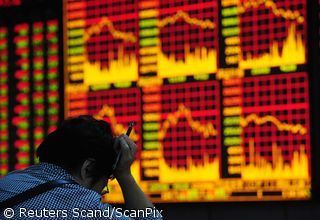Russian government calculations indicate that prices for a barrel of Russian oil will remain in the $20 - $25 range, First Deputy Prime Minister Mikhail Kasyanov.
Published:
15 April 2000 y., Saturday
Kasyanov said the ruble exchange rate was balanced, and not being maintained at an artificial level. However, the balance in the ruble rate "is not provided by economic growth but by an influx of hard-currency caused the high prices for Russian energy, particularly oil," he said. The recent decline in oil prices will not have a substantial impact on budget revenues, he said. Kasyanov acknowledged that it was traditionally more difficult to maintain the budget in the second quarter than in the first. However, the government is fully committed to "carrying out all planned spending, without resorting to Central Bank loans," he said. "We are working out all measures that would allow us to avoid borrowing, either in May or June," he said.
Šaltinis:
Interfax
Copying, publishing, announcing any information from the News.lt portal without written permission of News.lt editorial office is prohibited.
The most popular articles
 European conference promotes regional solutions to global challenges.
more »
European conference promotes regional solutions to global challenges.
more »
 Iceland‘s low-fare airline Iceland Express will launch regular flights by the new-generation „Boeing 737-700“ planes to about 8 different destinations from Vinius International Airport.
more »
Iceland‘s low-fare airline Iceland Express will launch regular flights by the new-generation „Boeing 737-700“ planes to about 8 different destinations from Vinius International Airport.
more »
 Over 3 million people around the world have lost their jobs due to the financial crisis and, according to the UN, economic recovery is unlikely to reach those that have suffered most - poor women and children.
more »
Over 3 million people around the world have lost their jobs due to the financial crisis and, according to the UN, economic recovery is unlikely to reach those that have suffered most - poor women and children.
more »
 The European Commission has today decided not to raise any objections to the public financing of infrastructure developments at three Lithuanian airports – Vilnius, Kaunas and Palanga International Airports.
more »
The European Commission has today decided not to raise any objections to the public financing of infrastructure developments at three Lithuanian airports – Vilnius, Kaunas and Palanga International Airports.
more »
 The European Commission has published the results of a public consultation launched in June 2009 on whether and how deadlines should be set for the migration of existing national credit transfers and direct debits to the new Single Euro Payments Area (SEPA) payment instruments.
more »
The European Commission has published the results of a public consultation launched in June 2009 on whether and how deadlines should be set for the migration of existing national credit transfers and direct debits to the new Single Euro Payments Area (SEPA) payment instruments.
more »
 A favourable climate for innovation in the EU can speed up the transition to an eco-efficient economy and increase Europe’s global competitiveness.
more »
A favourable climate for innovation in the EU can speed up the transition to an eco-efficient economy and increase Europe’s global competitiveness.
more »
 The International Monetary Fund (IMF) and the Deutsche Bundesbank have signed an agreement to provide the Fund with up to the equivalent of €15 billion (about US$22 billion).
more »
The International Monetary Fund (IMF) and the Deutsche Bundesbank have signed an agreement to provide the Fund with up to the equivalent of €15 billion (about US$22 billion).
more »
 Today the European Central Bank is publishing a report entitled “Euro Money Market Survey 2009”, which illustrates the main developments in the euro money market in the second quarter of 2009, in comparison with the second quarter of 2008.
more »
Today the European Central Bank is publishing a report entitled “Euro Money Market Survey 2009”, which illustrates the main developments in the euro money market in the second quarter of 2009, in comparison with the second quarter of 2008.
more »
 New EU laws proposed for closer oversight of financial services industry, sending a strong signal to this week's G20 summit.
more »
New EU laws proposed for closer oversight of financial services industry, sending a strong signal to this week's G20 summit.
more »
 The European Commission has repeatedly underlined that the restructuring plan of new Opel Europe must guarantee that the company will be viable in the future.
more »
The European Commission has repeatedly underlined that the restructuring plan of new Opel Europe must guarantee that the company will be viable in the future.
more »